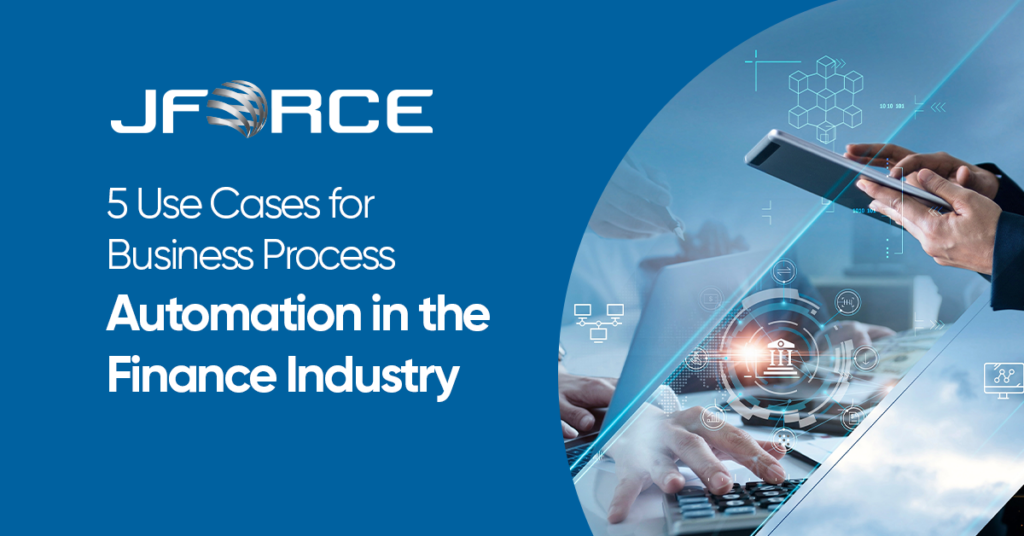
A report by Gartner shows that nearly 80% of finance leaders have implemented or plan to implement business automation tools. However, forward-thinking finance industry leaders are incorporating intelligent automation (IA) technologies beyond process management and robots into their business processes.
Business process automation (BPA) in the financial sector provides digital transformation of banks’ business models. Numerous technologies like AI and Decision Automation are supporting this transition to hyper automation.
Hyper Automation is a business-driven, disciplined approach that organizations use to rapidly identify, vet, and automate as many business and IT processes as possible. Hyper Automation involves the orchestrated use of multiple technologies, tools, or platforms, including Artificial intelligence (AI) Machine learning, Process automation, Business Rules Management, Orchestration, and Business Intelligence.
Customer Expectation in Digital Banking
Transformed by the impact of technology, customers expect banking to be personalized, reliable, and fast-paced. Only the most user-friendly and trustworthy banks gain a competitive edge.
Bank customers expect firm steps towards:
Easy accessibility and onboarding
Banks and other financial institutions must offer platforms that are easy to use on smartphones and desktop devices. According to Statista, in 2020 as many as 1.9 billion people worldwide actively used online banking services. This number is expected to reach 2.5 billion in 2024.
Digital onboarding of new customers giving easy access to banking and fintech services is also one of the top priorities. NFC Equipped smartphones reading chip passports and identity cards coupled with Face Detection and Liveness control makes remote onboarding as secure as possible.
24/7 support
Customers also expect to be able to take action at any time regarding their savings (which are very important to them) and receive support without having to wait. 49% of customers say instant support helps build loyalty. Technologies such as chatbots, instant video chat, and customer service via mobile apps offer 24/7 support and meet customer demand for improved access channels.
Personalized services
Different customers have different needs, expectations, and behaviors. For this reason, they want to see services and products that are not universal but of unique interest to them. Concrete analysis based on data enables banks to understand individual customers better and offer personalized experiences.
Banks that are listening to customer events and taking insightful actions achieve %70 higher success rates in sales-related activities.
Data security
The financial sector, where customers share highly sensitive and confidential data, must constantly focus on data security. Banks with a data deficit lose the trust of their customers at a rapid pace. Moreover, it is the legal responsibility of banks to protect data against malicious users.
Benefits of Business Process Automation
Business process automation for banks encompasses a more holistic approach beyond RPA's task-oriented process automation.
The financial services industry requires monitoring and managing constant changes that occur over large databases. When these processes are done manually, most employees must devote a significant part of their time to data entry and transfer. Those who work on these tasks that require intense attention are much more likely to make mistakes than robots are.
With automation, these processes can be completed quickly and without errors. Thus, staff motivation increases. Employees increase customer satisfaction by spending more time on tasks that require one-on-one meetings and human skills.
In short, hyper-automation in banking:
- Amplifies automation of work and automates processes.
- Makes workflows error-free.
- Fosters team collaboration and improves productivity.
- Increases business agility and straight-through processing.
- Improves accessibility to data and its storage mechanisms.
- Increases employee productivity by delegating repetitive and low-skilled labor-intensive tasks such as data entry to robots.
- Provides fast, quality service to customers by accelerating data-based tasks.
- Reduces the risk of regulatory and compliance errors
- Strengthens financial analysis and forecasting
Uses of Business Process Automation
The financial sector has widely adopted technology to make workflows fast and practical by using business process automation.
The main areas where automation is used are:
Initial Engagement
Customer engagement or the initial engagement process is the orientation process that takes place when users become customers of a bank or financial institution. It covers the entire process from initial registration to product activation and customer support during first use. It adds value to the onboarding process and boosts customer loyalty.
Automation replaces repetitive manual tasks with fast, error-free processes that eliminate common problems such as delays in the customer engagement process and data entry errors. Digital onboarding makes physical contact obsolete. Introducing video conferencing, chip id recognition, face, and liveness detection along with mobile capture makes the process simple and straightforward.
AML process which is part of Digital Onboarding ensures banks are compliant with new sanction lists and regulations. Moreover, freed from manual workload, employees can engage more closely with new customers. Thus, a stronger bond is established with the customer from the very beginning of their journey.
Lending process
The automated lending process simplifies and speeds up all steps for both the employee and the loan requester. Intelligent systems that automatically read and evaluate applications, score risks, and dynamically adjust rates can be used for the entire process, from responding to the application and, if positive, releasing payment.
Thus, banks and financial institutions can increase customer satisfaction along with the quality of their loan portfolio.
Card transactions
Customer satisfaction can be increased by reducing long waiting times by using automation in card transactions. With the help of RPA, you can easily manage requests by reducing the application review time that would normally take weeks to just minutes.
RPA automatically gathers data on different systems, examines card applications, and makes a decision based on pre-assigned rules. It can be used for different processes such as automation systems, updating card data, and reporting card usage during card usage.
Compliance process
Adherence to regulations is vital for the financial industry. To ensure accountability, you need to keep up with the ever-changing regulations. Completing the entire compatibility process with manpower causes vulnerabilities and wastes time.
Automation programs check your current compliance and audit status and notify you in real-time of any required changes so you remain compliant.
Fraud detection
The financial services industry, which is responsible for a large amount of confidential data, is under constant threat of intense fraud. Online banking accounted for 96% of all banking transactions and 93% of all fraud attempts in the first quarter of 2021. For this reason, the financial sector must focus on the fight against fraud.
Applications using artificial intelligence, machine learning, and complex event processing strengthen companies against rapidly developing fraud that threatens online banking, e-wallets.
For this, real-time fraud detection analyses vast amounts of data simultaneously and sends an alert when:
- An action that differs from the regular behavior of the user occurs,
- An unexpectedly substantial expense is incurred,
- A document whose validity is uncertain is entered into the system,
- Similar abnormal situations occur.
Changing customer expectations within the financial sector make it crucial for companies to participate in the digital transformation much faster than in some other industries. Banks and financial institutions that prioritize business process automation can carry out practical, error-free transactions, loan insurance processes, card transactions, compliance processes, and fraud detection.
Complete your digital transformation with JFORCE's banking solutions.
